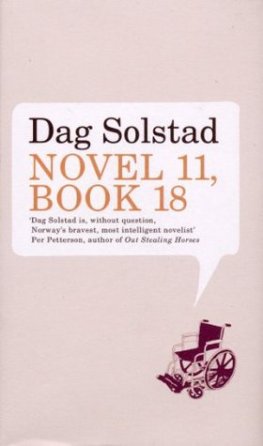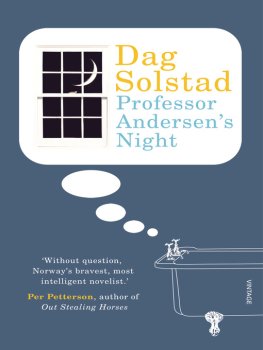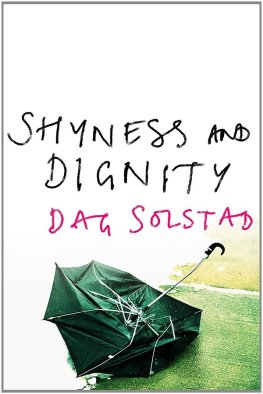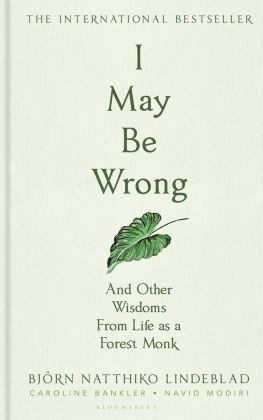Dag Solstad
Novel 11, Book 18
When this story begins, Bjrn Hansen has just turned fifty and is waiting for someone at the Kongsberg Railway Station. It has now been four years since he separated from Turid Lammers, with whom he had lived for fourteen years, from the very moment when he arrived at Kongsberg, which before that time barely existed on the map for him. He now lives in a modern flat in the centre of Kongsberg, a mere stones throw from the railway station. When he arrived at Kongsberg eighteen years ago, he had only a few personal belongings, such as clothes and shoes, plus crates and crates of books. When he moved out of the Lammers villa, he also took away with him only personal possessions, such as clothes and shoes, besides crates and crates of books. That was his luggage. Dostoyevsky. Pushkin. Thomas Mann. Cline. Borges. Tom Kristensen. Mrquez. Proust. Singer. Heinrich Heine. Malraux, Kafka, Kundera, Freud, Kierkegaard, Sartre, Camus, Butor.
When he had thought about Turid Lammers in the four years which had passed since the break-up, it had been with a sense of relief that it was over. At the same time hed had to admit, with an amazement that verged on grief, that he was no longer capable either of understanding or bringing back why he had been taken with her. It is beyond doubt, however, that he had been. Otherwise, why would he have broken his marriage to Tina Korpi and abandoned her and their two-year-old son to follow Turid Lammers to Kongsberg, in the secret hope that she would have him? It was because of Turid Lammers that he had ended up at Kongsberg. Without her, or his now forgotten enthralment by her, he would never have ended up here. Never. His life would have been altogether different. It would never have occurred to him to apply for the position of town treasurer at Kongsberg in fact, he would not have dreamed of applying for a position as treasurer at all, but would probably have continued in the ministry, made a passable career there, and today in all likelihood would have been head of a government office or have moved on to a high position in the Communications Administration, the Norwegian State Railways or something of the sort. But never town treasurer. Never Kongsberg.
It troubled him that he was unable to bring back the fascination which Turid Lammers had had for him when he first met her. A skinny, nervous woman that was how he remembered her. When they met she had just returned from France, where she had lived for seven years, with a wrecked marriage behind her. She settled in Oslo and immediately took a lover. The lover was him. Was it his fascination with the effect that womens nerves have on their surroundings that had ensnared him? Those restless mood swings? After half a year her father died, and she moved back to the provincial town she had come from, Kongsberg. Here she settled down in an old villa, took over the management of a florists with her elder sister, and took a job as teacher at Kongsberg Secondary School, where she taught French, English and drama.
Her father died in September. She went home for the funeral and the settlement of the estate, and returned to Oslo after one week. For a month she lived as before. But then she suddenly decided to move back to Kongsberg. She told her lover on Wednesday evening and by Sunday she was gone. When she said she intended to move, he first felt relief. At long last he could restore normal order to his life. He was married to Tina Korpi and they had a two-year-old son. He had not told Tina about Turid, it was a secret erotic adventure on his part. Actually it suited him well that she went away now, to Kongsberg and out of his life, leaving nothing more behind in his consciousness than the memory of a moment of stolen happiness.
But then he got to thinking that he couldnt let her down. He had to go to Kongsberg, to her, otherwise he would come to regret it for the rest of his life. Indeed, the absolute certainty that he would have regrets made returning to Tina and their son, to continue as before but now without a secret love, impossible. And so he disclosed his secret to his wife and cut loose from his marriage.
Aside from the relief he had initially felt when Turid said she was now going home for good, there was also his sense that it could not last; he had already then seen clearly what fourteen years later would result in his leaving her. He had no illusions that she would give him happiness. But when it dawned on him that she really was gone, he missed her so terribly that he was seized by a veritably moral urge to remain close to this woman who was constantly sending out nervous signals to her surroundings, who was never at rest, who was full of ideas, all the time, every hour of the day.
It is possible that he told Tina he had found love and that he could not betray it. In all likelihood he did. It bothered him that he could recall nothing about Turid Lammers from that time to justify these big words. Apart from a few insignificant episodes, such as he and Turid walking arm in arm along the pavement somewhere. Then Turid catches sight of a banana peel, right in front of her on the pavement. She bends down without letting go of his arm and picks it up. Then she flings it into the middle of the street and says, merrily: I hope the cars will skid on it! Good God, he had thought (then or later), this is her way of solving her problems! He was employed in a ministry, as he had been ever since he took his university degree in economics six years previously, and had already been promoted to office manager, no more than thirty-two years old. His lover was also thirty-two, a teacher. And so she picked up the banana peel from the pavement and simply flung it somewhere else. At the cars. Completely wacky. He must have been fascinated. But also uneasy, at any rate with a view to possibly sharing his life with her (but that had to be later). Was it episodes like this that made him tell Tina that he had found love and could not betray it? The alternative would have been to say that he was having an adventure and couldnt give it up. That, however, he could not have said, despite the fact that it expressed to perfection why Bjrn Hansen a poor boy from a Norwegian coastal town, this successful young civil servant in one of our ministries left his wife and two-year-old son to set out for Kongsberg and an uncertain future. It was his obsession with the adventure that had sucked him in, so intensely that he could barely breathe, and not his love for Turid Lammers. The allure of it. Deep down Bjrn Hansen knew that the most desirable happiness on this earth was a brief happiness, and now he was experiencing it by seeking out Turid Lammers secretly in her little flat at St Hanshaugen in Oslo. He had never lived so intensely before, because he knew he was in a place where he would not stay for long. It was a dangerous game. Stolen happiness. And since Turid Lammers was the object of all this stolen happiness, he also started saying to himself that it was his love for her that he could not betray. But it wasnt true. Turid Lammers was nothing apart from the adventure, the circumstances surrounding their relationship. Her mimicry, her glances, her gestures, which would send shudders through him, those small wrists, so beautiful and French in their grace, her way of walking everything received its lustre from the circumstances surrounding their relationship. He knew all that. To tell the truth, he was fully aware of it. He had played this game quite consciously, cultivating these stolen moments. He ought to have told his wife: I cannot possibly be certain that this is love, because I barely know her. I know her only from specific situations, where she is the object of my fascination. But these situations fulfil so many of my innermost desires, well, of what I expect from life, that now, when she has betrayed these situations by breaking out of them, I have to set out after her in an attempt to find her again.












